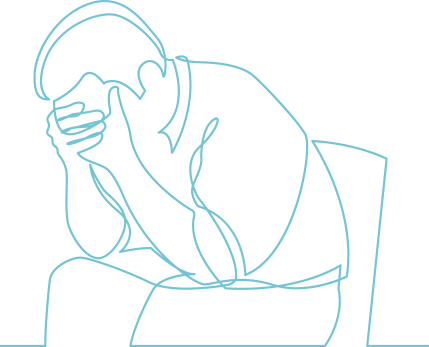Archives
Categories
What is Major Depressive Disorder?
Major Depressive Disorder (MDD) is a serious mental health condition that affects how you think, feel, and behave. It can cause persistent sadness, loss of interest in daily activities, and physical symptoms that interfere with work, relationships, and overall well-being.
When left untreated, MDD can weaken neural pathways in the brain’s Salience Network, disrupting emotional regulation and cognitive function. However, effective treatments, including TMS therapy, can help restore these connections and improve symptoms.
How Depression Impacts the Brain
The brain plays a vital role in regulating mood, thoughts, and emotions. When functioning properly, it processes and responds to emotions in a balanced way. However, in individuals with Major Depressive Disorder, communication between key brain regions becomes disrupted—leading to mood imbalances, increased anxiety, and sleep disturbances.
Our FDA-cleared, non-invasive TMS therapy helps restore these disrupted neural connections by stimulating and strengthening specific areas of the brain. Similar to physical therapy for the brain, TMS enhances communication between these regions, helping patients regain emotional balance and reconnect with their lives.
How Does TMS Therapy Treat Depression?
TMS therapy uses MRI-strength magnetic pulses to safely and precisely target disengaged neural pathways in the brain. Over time, these pulses stimulate and strengthen inactive synapses, restoring proper communication between key brain regions. As these connections are reestablished, patients often experience better mood regulation, reduced depression symptoms, and a renewed ability to engage fully in life.
Improved Focus & Sleep – Many patients experience enhanced concentration, more restful sleep, and mild improvements in cognition and memory.
Improved Focus & Sleep – Many patients experience enhanced concentration, more restful sleep, and mild improvements in cognition and memory.
Improved Focus & Sleep – Many patients experience enhanced concentration, more restful sleep, and mild improvements in cognition and memory.
Patient's Guide to Understanding Depression
TMS therapy uses MRI-strength magnetic pulses to safely and precisely target disengaged neural pathways in the brain. Over time, these pulses stimulate and strengthen inactive synapses, restoring proper communication between key areas of the brain. As these connections are reestablished, patients experience improved mood regulation, reduced depression symptoms, and a renewed ability to engage fully in life.

What is Anxious Depression?
Anxiety and depression are distinct disorders, but what happens when you experience both?
Research shows that nearly half of individuals with depression also struggle with anxiety. When these conditions occur together, it can complicate treatment and make symptoms more challenging to manage. Understanding the connection between anxiety and depression is essential for finding the right approach to recovery.

FDA-Approved TMS Treatments
TMS (Transcranial Magnetic Stimulation) is a non-invasive brain stimulation therapy approved by the FDA for certain mental health and neurological conditions.
FDA-Approved Uses for TMS:
FDA-approved for treatment-resistant depression.
Cleared by the FDA as an adjunct treatment.
Short-term FDA-approved treatment to help quit smoking.
TMS continues to be studied for additional conditions, but these are currently the only FDA-approved uses.
TMS Therapy Facts for Depression
Improved Mood & Energy – Many patients report feeling more emotionally balanced, energized, and motivated after several weeks of treatment.
No Sedation or Downtime – TMS is non-invasive and doesn’t require anesthesia, so you can resume normal activities right after each session.
Time-Efficient – Sessions last about 20 minutes and are easy to fit into your daily routine.
Supports Overall Wellness – TMS works well alongside therapy, healthy lifestyle habits, and prescribed medications to support long-term mental health.
TMS Treatments
Studies suggest TMS may help manage bipolar depression and mania.
Early research indicates TMS might be a safe and effective treatment.
Promising results in reducing tinnitus symptoms.
TMS is FDA-approved for treating MDD and has shown strong results in reducing symptoms of depression.
TMS is FDA-approved for OCD and may help reduce intrusive thoughts and compulsive behaviors.

